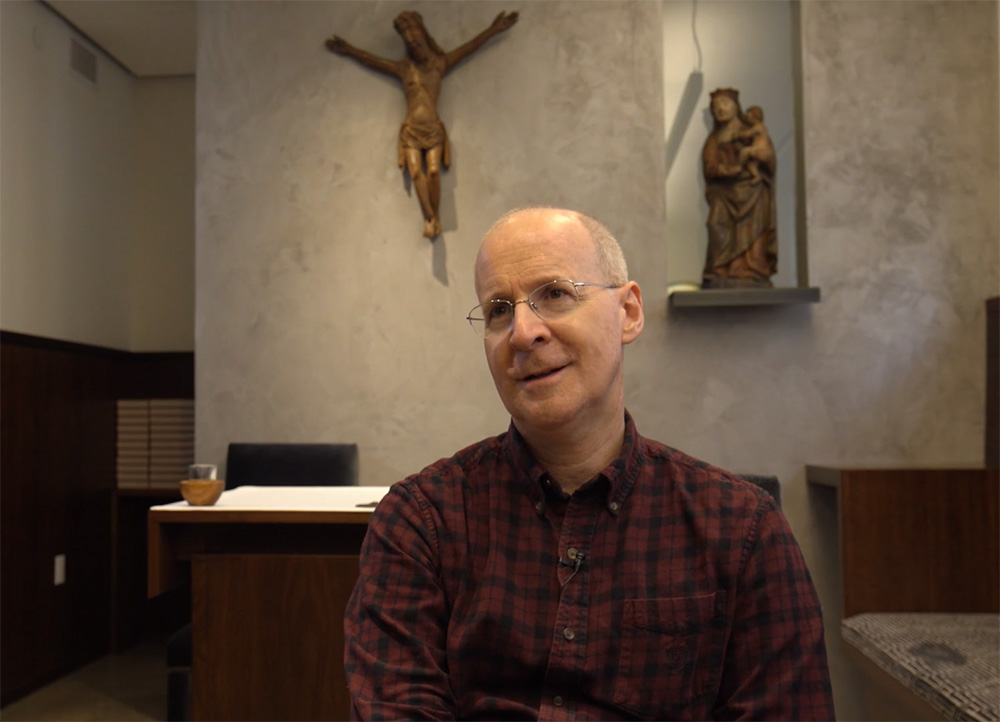
Jesuit Fr. James Martin is pictured in a still from the 2021 film "Building a Bridge." (NCR screenshot/Obscured Pictures)
Jesuit Fr. James Martin is one of the best-known Catholic advocates for LGBTQ dignity. Following the 2017 publication of the first edition of his book Building a Bridge: How the Catholic Church and the LGBT Community Can Enter into a Relationship of Respect, Compassion, and Sensitivity, Martin has spoken at events worldwide — and even to Pope Francis — about advocating for more compassionate treatment of the Catholic Church's LGBTQ community.
Martin's life and work is the subject of a new documentary, "Building a Bridge," which was executive produced by Martin Scorsese and debuted June 15 at the Tribeca Film Festival. The film was directed by Evan Mascagni and Shannon Post, and will be available to stream for viewers in the U.S. on the Tribeca website starting June 16.
Ahead of the film's release, NCR spoke to Martin about the documentary and his ministry. This Q&A has been edited for length and clarity.
NCR: What motivated you to participate in this film?
Martin: The filmmakers approached me a few years ago. The filmmakers are people who focus on social justice issues. And so I thought, "Sure, you can follow me around."
I actually thought it was going to be a little YouTube video. I didn't think it was going to be a real film. I thought even if they just put out a little film, it could help get the message out, and hopefully help more LGBTQ people and their families.
In the film, Fr. Bryan Massingale refers to this period as an "early spring" in the church's relationship with the LGBTQ community. What signs of growth are visible in this relationship?
That metaphor was all Bryan's. But there are signs of growth. You see signs of growth in Pope Francis' openness to the LGBTQ community, his appointment of various bishops who are more welcoming to that community, and especially on the local level at parishes and schools, where you have many more outreach groups and programs for LGBTQ Catholics.
The mass shooting at the Pulse Nightclub, an LGBTQ nightclub in Orlando, Florida, was one of the worst in American history. Forty-nine people were killed. How did that tragedy galvanize you?
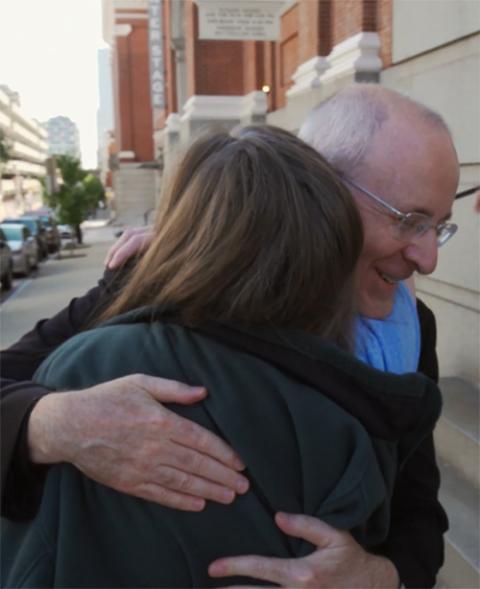
Jesuit Fr. James Martin embraces Christine Leinonen, who lost her son Drew in the 2016 mass shooting at the Pulse nightclub in Orlando, Florida in a still from the 2021 film "Building a Bridge." Leinonen, whose son was gay, is now an advocate for LGBTQ rights. (NCR screenshot/Obscured Pictures)
Before 2016, I had written about LGBTQ people and advocated for them from time to time in America magazine. But I had never really done anything formally. I had never been part of an LGBTQ outreach group or ministry.
The tepid response from many church leaders in the wake of the Pulse nightclub massacre just made me think that even in death, these people are invisible to the church. And so that led to a talk at New Ways Ministry, which led to a book, which led to this ministry, which I do with lots of other people. It invited me to be a little more public about advocating for the community.
What surprised you the most about the reaction to the first edition of your book Building a Bridge?
The reaction was shocking, both positive and negative. The positive reaction was surprising — it consisted of packed churches, standing ovations, long lines of people waiting to talk to me.
The book doesn't challenge any church teaching, and I thought it was fairly mild. And yet the reaction — particularly from LGBTQ people and their families — was extraordinary. I was stunned. It was meant to be a little book — it's physically little — and it was meant to be just a modest contribution to parish life. It certainly wasn't intended to be a manifesto.
The negative reaction was shocking, too, especially the personal vilification. It was not simply people challenging or critiquing some of the things that I was suggesting — even though nothing is against church teaching — but personal attacks, which I still get online daily, and sometimes in person.
If I disagreed with somebody, I would never attack them personally. I wouldn't say you should go to hell, you should be excommunicated, you're a terrible Catholic or you're a heretic. So that was kind of shocking. It revealed how much homophobia and hatred there is in the church, which was sad.
How do you handle these negative reactions to your book from conservative elements of the church and people who are posting abusive comments online?
It bothered me at the beginning, because it was such a surprise, but then I realized that if I'm going to pattern my life after Jesus, he dealt with this too, and he was free of the need to be loved, liked or approved of by people.
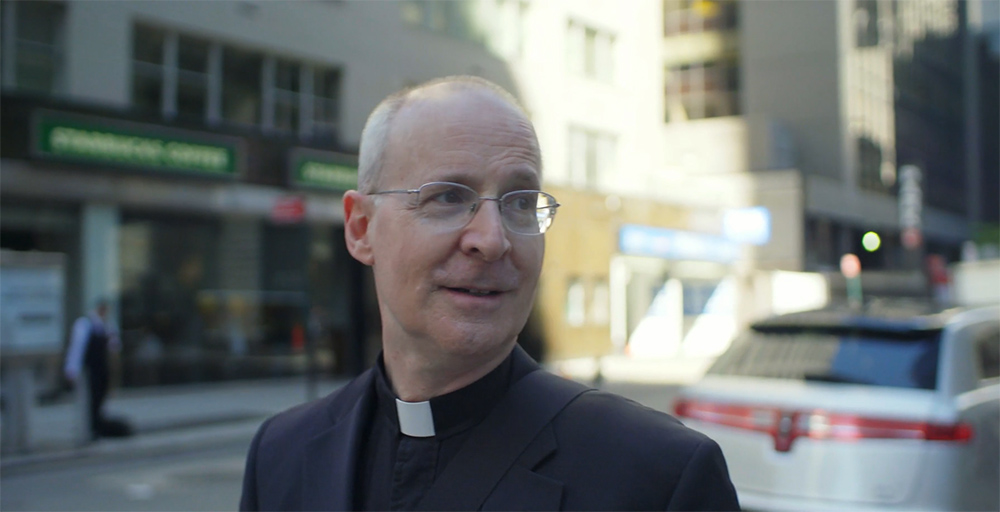
Jesuit Fr. James Martin walks through New York City in a still from the 2021 film "Building a Bridge," executive produced by Martin Scorsese. (NCR screenshot/Obscured Pictures)
So if it's a legitimate critique or a thoughtful question, I'll answer it, but if it's just hatred, or homophobia, then I ignore it. I don't let it in. I don't let it make a claim on me. It's just from homophobic, hateful, mean people. Some people are just mean. It has very little to do with theology. It's like schoolyard bullying.
Parts of the film focus on Michael Voris, founder of the ultraconservative, anti-gay Catholic group Church Militant, who says in the film that he once identified as gay. What are your thoughts on Voris and his story?
It's baffling to me, because he talks in the movie about his life as a gay man. And yet, he's seemingly so angry about welcoming LGBTQ people into what is their church, too. I don't want to comment on him, but as I say in the film, I hope he finds some peace in his life. Because Church Militant seems to be motivated mainly by anger.
I thought that the filmmakers did a good job of letting him explain his point of view. They flew out there, and they spent several days with him. No one can say that he wasn't given a chance to tell his story.
On the more positive side, what were some of the most meaningful responses you received from readers of your book who connected with it?
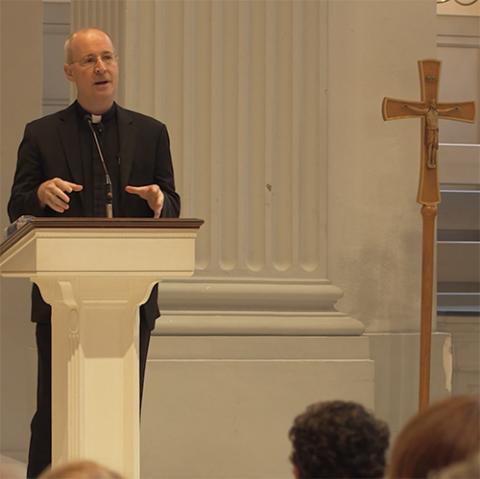
Jesuit Fr. James Martin speaks about LGBTQ rights to an audience in a still from the 2021 film "Building a Bridge." (NCR screenshot/Obscured Pictures)
I get them every day through Facebook messages. I just got one an hour ago, from someone who talked about someone in their family who came out, who has read the book and felt more at home. Anytime I hear stories about people finding the book, and the book helping them to feel more at home in their church, is very gratifying.
Ninety-five percent of the responses are positive. If I go to a parish talk, there'll be 400 people inside and five people outside protesting. Hearing from LGBTQ people or their parents who are trying to find a place in the church, and the book helps them to see how they're already at home — that's very gratifying. And it makes putting up with all the abuse online worthwhile.
The documentary touches on critiques of the first edition of your book from some LGBTQ Catholics. How did you respond to such suggestions in your second edition?
One of the great things about my publisher was that because there was so much of a response to the book, I asked them if I could do an updated edition, and they agreed immediately. Usually, that takes a year or two. I was able to incorporate a lot of the changes that people had suggested. I was very happy to be able to do that to make the book more realistic.
The second edition is almost twice as long as the first edition, and it has many more stories and much more explanation. I wrote the first edition thinking this would just be almost like a little handbook. But when I realized that so many people were using it as a resource for how they thought about LGBT issues in the church, I thought the book needs to be a lot fuller.
In the film, one critique of the first edition from the LGBTQ community was that the concept of "building a bridge" seemed to be asking LGBTQ people to meet the church halfway, when the church is the one with the institutional power. How do you understand the concept of "building a bridge"?
That was the most helpful critique. When I sketched that idea of a bridge, the idea that it would be a two-way bridge — that both sides would treat one another with compassion — made sense.
Advertisement
But LGBTQ Catholics challenged me, and they were right. The bridge lanes aren't of equal size, because it is the institutional church that has marginalized the LGBTQ community, not the other way around. So I was very clear in the second edition that the onus is on the church to reach out, because they are in the position of institutional power.
You talk in the documentary about speaking out on LGBTQ dignity without challenging church teaching. Some people — like Fr. Bryan Massingale in the film — have said there are teachings that need to be changed in order to afford LGBTQ people full dignity within the church. How do you navigate the tensions between working within the church and pushing the church to respect LGBTQ people?
That's a great question. I do that by encouraging the church first to listen to the experiences of LGBTQ people, and to take seriously their responses to some of these church teachings. Secondly, I do so by stressing something which is more fundamental, which is Jesus's message of love, mercy and compassion.
I'm not challenging any church teaching. In fact, I'm trying to get people to pay attention to the most important church teaching, which is Jesus's message of love. I think too often, we tend to say church teaching equals these three lines in the catechism about LGBTQ people or about homosexuals.
Church teaching is not just a few lines. It's Jesus' example. And in Jesus, we see someone who is consistently reaching out to people around the margins. To me, that's the most fundamental of church teachings. I think that's the one we're overlooking the most.
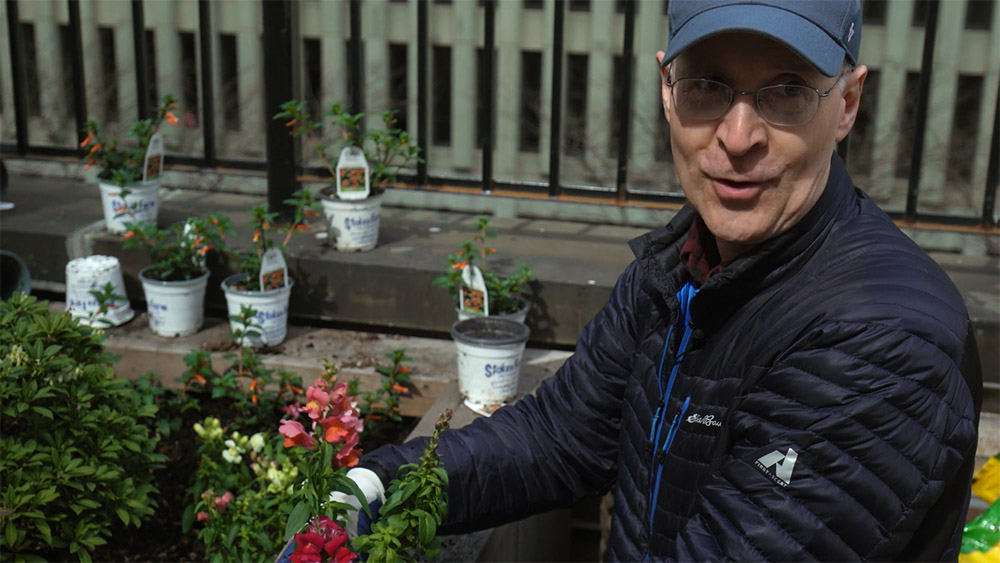
Jesuit Fr. James Martin is pictured gardening in a still from the 2021 film "Building a Bridge." (NCR screenshot/Obscured Pictures)
You've attained a high level of celebrity since Building a Bridge was published — both within the church and in mainstream media. How do you use this platform you now have?
It's an outgrowth of my ministry as a Jesuit. And so it's not just focused on LGBTQ people, but on spreading the Gospel.
The celebrity — I don't get too wrapped up in that because as many people support me as despise me, so it's easy not to get a big head. It's easy to keep humble. Being invited to comment in the media and having a social media platform is just another way of reaching people.
And we need to go to where people are. That's what Jesus did. He met people where they were and he spoke their language. These days, that's being on Facebook, Twitter, Instagram and even TikTok.
In 2019, you had the opportunity to speak privately with Pope Francis. How did that conversation go?
He asked me not to talk about the details, so we could speak freely, but it was one of the high points of my life. We spoke for half an hour about LGBTQ ministry in the church. And I left feeling inspired and consoled and just elated. It was really profound for me. When I left his study, I literally felt like I was walking on air. I had never felt that before. I felt lighter. It was a turning point for me.
Where do you think the church needs to go from here? What challenges remain ahead for building bridges between the church and LGBTQ Catholics?
I think the first thing that the church needs to do is to listen to the experiences of LGBTQ people, which the church, for the most part, is still not doing. It's preaching about them, and issuing condemnations about them and making statements about them without actually listening to them. That's the first thing.
The second thing is the church has to stop targeting LGBTQ people for these firings, as if they're the only ones whose lives don't conform to church teaching.
And third, in countries where bishops still align themselves with discriminatory policies against LGBTQ people, the church should speak up.
An easy thing for the church to support would be the decriminalization of homosexuality. In some countries, you can be executed for being gay, and in other countries, people are rounded up. There was just a situation in Uganda where they arrested 44 people at an LGBT shelter. In many places, LGBT issues are life issues.
Those are some easy things the church could do. No. 1, listen; No. 2, stop targeting; and No. 3, advocate for them when their lives are endangered.







